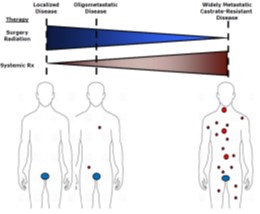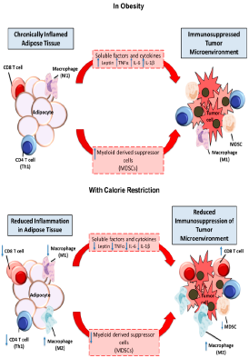Admin Core
 The mission of our administrative core (admin core) is to ensure that the research projects and cores are able to work together efficiently, set priorities for inter-project collaborations, validate mechanisms across profiling platforms, and communicate research results internally and externally. We seek to be dynamic contributors to the National Cancer Institute (NCI) ROBIN program, to collaborate with the NCI and the cancer research community, and to be a partner for patient advocates and connect basic research to improved patient outcomes. The leadership of our ROBIN OligoMET Center is strongly committed to mentoring the next generation of leaders in radiation and metastasis research.
The mission of our administrative core (admin core) is to ensure that the research projects and cores are able to work together efficiently, set priorities for inter-project collaborations, validate mechanisms across profiling platforms, and communicate research results internally and externally. We seek to be dynamic contributors to the National Cancer Institute (NCI) ROBIN program, to collaborate with the NCI and the cancer research community, and to be a partner for patient advocates and connect basic research to improved patient outcomes. The leadership of our ROBIN OligoMET Center is strongly committed to mentoring the next generation of leaders in radiation and metastasis research.
The admin core focuses on three aims:
- Scientific and financial management of the ROBIN OligoMET Center.
- Communication and review: External Advisory Committee (EAC), Internal Advisory Committee(IAC), patient advocates, and NCI.
- Pilot research grants focusing on early-stage investigators and diversity.
Project Leaders: Amit Sawant, PhD (contact PI) and Erika Davies, PhD (contact MPI)
Executive Committee: Phuoc Tran, MD, PhD, Erika Davies, PhD, Nicole Simone, MD (Thomas Jefferson University), Amit Sawant, PhD, Lei Ren, PhD, Luigi Marchionni, MD, PhD (Weill Cornell Medicine), Mark Mishra, MD, and pilot grant reviewers
Project 1: Genomics, Radiomics, & LIQ BX
 This project proposes a dynamic Epithelial-Mesenchymal Plasticity (EMP) program which directs PCa cells to revert back and forth along the spectrum of EMT-MET to facilitate self-seeding. Stereotactic ablative radiotherapy (SABR) is a highly focused, high-dose short radiation course that is suited for the treatment of metastases as it targets cancer cells as well as tumor microenvironment (TME) cells. Interventions that effectively target the TME component, such as SABR, appear poised to arrest self-seeding and subsequent maturation of metastases. We have launched our TERPS trial - phase II randomized total eradication of metastatic lesions following definitive Radiation to the Prostate in de novo oligometaStatic prostate cancer, to help answer important questions in the setting of a first-in-man clinical trial.
This project proposes a dynamic Epithelial-Mesenchymal Plasticity (EMP) program which directs PCa cells to revert back and forth along the spectrum of EMT-MET to facilitate self-seeding. Stereotactic ablative radiotherapy (SABR) is a highly focused, high-dose short radiation course that is suited for the treatment of metastases as it targets cancer cells as well as tumor microenvironment (TME) cells. Interventions that effectively target the TME component, such as SABR, appear poised to arrest self-seeding and subsequent maturation of metastases. We have launched our TERPS trial - phase II randomized total eradication of metastatic lesions following definitive Radiation to the Prostate in de novo oligometaStatic prostate cancer, to help answer important questions in the setting of a first-in-man clinical trial.
This project will test two aims:
- Epithelial-mesenchymal plasticity of circulating tumor cells (CTCs) are biomarkers for men with oligometastatic prostate cancer treated with SABR. We will pursue a number of correlative tissue, liquid, imaging and immune studies from our TERPS trial to examine for EMP markers -EMT and MET.
- To determine the effects of SABR on prostate cancer self-seeding in epithelial-mesenchymal plasticity prostate cancer mouse models. Use cell based EMP PCa models and serial non-invasive imaging in mice to test the self-seeding hypothesis for PCa and if EMP factors modulate self-seeding.
Project Leaders: Amit Sawant, PhD, Phuoc Tran, MD, PhD, Lei Ren, PhD
Project 2: Metabolomics & Disparities
 Project 2 proposes that altered metabolism in cancer cells is recognized as a hallmark of malignant transformation and has been shown to be in part responsible for metastatic spread due to its role in the fate of anchoring metastases to the tumor microenvironment. Therefore, understanding radiation response as it relates to the tumor and patient metabolism will be key in determining the subset of patients who will require metabolic interventions to optimize outcomes for prostate cancer with oligometastatic disease. We hypothesize that precision nutrition can be used to reprogram the metabolic alterations induced by the driver oncogenes to improve radiation response and oligometastatic prostate cancer outcomes by affecting a positive change in the patients’ anti-tumor immunity.
Project 2 proposes that altered metabolism in cancer cells is recognized as a hallmark of malignant transformation and has been shown to be in part responsible for metastatic spread due to its role in the fate of anchoring metastases to the tumor microenvironment. Therefore, understanding radiation response as it relates to the tumor and patient metabolism will be key in determining the subset of patients who will require metabolic interventions to optimize outcomes for prostate cancer with oligometastatic disease. We hypothesize that precision nutrition can be used to reprogram the metabolic alterations induced by the driver oncogenes to improve radiation response and oligometastatic prostate cancer outcomes by affecting a positive change in the patients’ anti-tumor immunity.
This project will have three aims:
- Determine radiation response of consolidative SABR on oligometastatic prostate cancers that have lipogenic versus glucogenic metabolic profiles.
- Use preclinical models to determine the effects of metabolic reprogramming of prostate cancer cells and tumor microenvironment on radiation-induced anti-tumor immunity and consequences on metastatic potential.
- Determine the influence of social determinants of health, including race, on radiation response in prostate cancer patients with oligometastatic disease treated with radiation. Our diverse patient population will allow for the understanding of the contributions of patient stressors on radiation outcomes. Results from this proposal will allow for future trial design using a precision approach to metabolically impact patients and improve outcomes with radiation.
Project Leader: Nicole Simone, MD (Thomas Jefferson University)
Molecular Characterization Trial: TERPS
 Our current U54 ROBIN Oligometastasis (ROBIN OligoMET) Molecular Characterization Trial (MCT) will conduct correlative studies from this first-in-man randomized trial of SABR MDT in men with de novo oligometastatic prostate cancer. We hypothesize macroscopic prostate tumors support the growth of and help nurture future distant metastases. In addition, we hypothesize that tissue, imaging and circulating biomarkers can identify men with de novo oligometastasis Pca that benefit the most from SABR.
Our current U54 ROBIN Oligometastasis (ROBIN OligoMET) Molecular Characterization Trial (MCT) will conduct correlative studies from this first-in-man randomized trial of SABR MDT in men with de novo oligometastatic prostate cancer. We hypothesize macroscopic prostate tumors support the growth of and help nurture future distant metastases. In addition, we hypothesize that tissue, imaging and circulating biomarkers can identify men with de novo oligometastasis Pca that benefit the most from SABR.
The MCT has two aims:
- To validate prognostic-predictive ability of tissue and liquid biomarkers using the first-in-man randomized trial of stereotactic ablative radiation (SABR) consolidation in men with de novo oligometastatic castration-sensitive prostate cancer.
- To validate prognostic-predictive ability of radiomics using the first-in-man randomized trial of stereotactic ablative radiotherapy (SABR) consolidation in men with de novo oligometastatic castration-sensitive prostate cancer
Project Leaders: Phuoc Tran, MD, PhD, Mark Mishra, MD
Clinical Trial Coordinator: Nicole Helie
Cross-Training Core
 The Cross-Training Core (CTC) for the U54 ROBIN OligoMET Center will consist of experienced faculty members from the Division of Computational and Systems Biology (CSP) in the Department of Pathology and Laboratory Medicine of Weill Cornell Medical College (WCM). The team at WCM will work in close collaboration with teams at our center institutions, and a history of collaboration already exists between the CTC team members and the investigators leading the research projects and other cores, which will further ensure the successful progression of the center.
The Cross-Training Core (CTC) for the U54 ROBIN OligoMET Center will consist of experienced faculty members from the Division of Computational and Systems Biology (CSP) in the Department of Pathology and Laboratory Medicine of Weill Cornell Medical College (WCM). The team at WCM will work in close collaboration with teams at our center institutions, and a history of collaboration already exists between the CTC team members and the investigators leading the research projects and other cores, which will further ensure the successful progression of the center.
The CTC activities are centered around the following aims:
- Provide a unified analytical framework across the U54 ROBIN OligoMET Center to foster cross-project data integration and comparison.
- Provide educational support and training across the U54 ROBIN OligoMET Center.
- Develop novel analytical approaches for the comprehensive characterization of oligometastatic prostate cancer (PCa) via integrated analyses of multimodal big data.
Project Leaders: Lei Ren, PhD, Amit Sawant, PhD, Luigi Marchionni, MD, PhD (Weill Cornell Medicine)
Resource Sharing Core
 The Resource Sharing Core will provide centralized and cost-effective support to the projects by providing a wide range of data storage and analysis support needed for the projects, including multi-omics, imaging, and dosimetry data in radiation oncology. The core service provides a crucial way to coordinate data collection, storage, and sharing to ensure data from the main projects are analyzed consistently and efficiently.
The Resource Sharing Core will provide centralized and cost-effective support to the projects by providing a wide range of data storage and analysis support needed for the projects, including multi-omics, imaging, and dosimetry data in radiation oncology. The core service provides a crucial way to coordinate data collection, storage, and sharing to ensure data from the main projects are analyzed consistently and efficiently.
This project has the following three aims:
- Provide state-of-the-art methods for multi-omics data analysis and storage to project researchers.
- Develop tools and infrastructure for extraction, analysis, and storage of imaging and dosimetry data in radiation therapy.
- Provide cloud-based platforms and infrastructures for resource sharing across institutions.
Project Leaders: Lei Ren, PhD, Amit Sawant, PhD, Luigi Marchionni, MD, PhD (Weill Cornell Medicine)
Follow Us On X:
 The ROBIN OligoMET Center: https://x.com/ROBINOligoMETC
The ROBIN OligoMET Center: https://x.com/ROBINOligoMETC
Department of Radiation Oncology: https://x.com/UMarylandRadOnc
